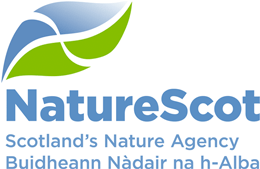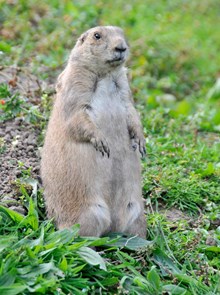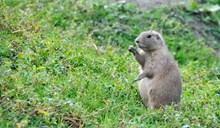05 February, 2015
Escaped prairie dogs under control
Prairie dogs which were on the loose at an East Lothian open farm in 2013 are now recaptured and in a secure enclosure, under the first agreement of its kind to control invasive non-native species in Scotland.
Prairie dogs are native to North America, where cattle farmers claim that they can cause considerable damage to pastures. In the case in East Lothian, the animals were free to roam around East Links Farm Park and it was feared individuals might escape into the neighbouring John Muir Country Park, part of the Forth Site of Special Scientific Interest (SSSI), a protected natural area.
This is the first time a voluntary agreement of this kind has been used to control non-native species. In July 2012, Scotland introduced new laws, which are some of the most wide-ranging and comprehensive laws on non-native species in Europe.
The Scottish legislation allows for a staged approach to dealing with escaped non-native species. A voluntary, co-operative agreement is the first stage and we would expect this normally to be sufficient. But if it doesn't work, we have the option to go for a compulsory order, and then court action if it becomes necessary. This type of court action was seen last November where a Cumbrian zoo was heavily fined for the escape of Sacred Ibis birds, which can have a devastating effect on tern colonies and other nesting birds.
Invasive non-native species are the second most serious threat to global biodiversity after habitat loss, with non-native species costing the Scottish economy around £246 million each year. For example, it’s estimated that rabbits, which were introduced to Britain by the Romans and are not unlike prairie dogs in their habits, now cost agriculture and forestry £81 million annually.
Stan Whitaker, SNH’s invasive non-native species expert, said:
“Our concern was that, if prairie dogs became established, they would have a negative impact on natural areas and farmland.
“Scotland is the first in the UK to use this type of voluntary, cooperative agreement to make sure that invasive, non-native animals don’t spread and cause damage to the countryside. We believe this is a much more effective way to work with wildlife parks and others, rather than levying fines. We hope this will encourage people to be more open when animals or birds escape, and result in better control of invasive species by working together.”
Grant Bell of East Links Farm Park added:
“Prairie dogs are humorous wee guys loved by our visitors for their antics but they don’t voluntarily offer themselves up to capture or enclosure. The challenge here was to create an environment whereby the animals would have a secure enclosure that allowed them plenty of freedom and still let our visitors enjoy them. The collaboration with SNH allowed us to create an enclosure that suited our needs but also exceeded their expectations and criteria.”
Prairie dogs are rodents – part of the squirrel family - which live on North America's prairies and open grasslands in a fraction of their former numbers. As land was converted to farming or pasture, they were often killed as pests because of their destructive landscaping. Prairie dogs live in extensive underground warrens of tunnels and chambers, marked by mounds of packed earth at surface entrances.
Zoos, parks and private collections are legally obliged to keep their animals and birds in secure enclosures. If they allow them to wander, they are breaking the law. If any animals or birds escape from enclosures, they should try to re-capture them and notify the relevant authorities.
If you see an escaped animal or bird, you should report it to Scottish Natural Heritage by contacting Scotland’s Environmental and Rural Services (SEARS) 24/7 Customer Service Helpline on 08452 302050, or email info@sears.scotland.gsi.uk .
You can also report invasive plants and freshwater and marine invasive species using the mobile apps, PlantTracker, AquaInvaders, and Sealife Tracker. Apps may be downloaded from:
AquaInvaders - http://naturelocator.org/aquainvaders.html
Sealife Tracker - http://naturelocator.org/sealife.html
Plant Tracker - http://naturelocator.org/planttracker.html
MEDIA QUERIES - for more information, contact SNH press & public relations officer, Vicki Mowat on vicki.mowat@snh.gov.uk or 0131 316 2659 (Tues-Fri) or call the main Inverness press office on 01463 725 022 (Mon).
For more information on prairie dogs or for free pictures, see the GB non-native species secretariat web page at
http://www.nonnativespecies.org/factsheet/factsheet.cfm?speciesId=1131
Contact information
- Name
- SNH Media
- snhmedia@snh.gov.uk
NatureScot is Scotland's nature agency. We work to enhance our natural environment in Scotland and inspire everyone to care more about it. Our priority is a nature-rich future for Scotland and an effective response to the climate emergency. For more information, visit our website at www.nature.scot or follow us on X at https://x.com/NatureScot
’S e NatureScot buidheann nàdair na h-Alba. Bidh sinn a’ neartachadh àrainneachd na h-Alba agus a’ brosnachadh dhaoine gu barrachd suim a chur ann an nàdar. Tha e mar phrìomhachas againn gum bi nàdar na h-Alba beairteach agus gun dèilig sinn gu h-èifeachdach le èiginn na gnàth-shìde. Tha an tuilleadh fiosrachaidh aig www.nature.scot no air X aig https://x.com/NatureScot


